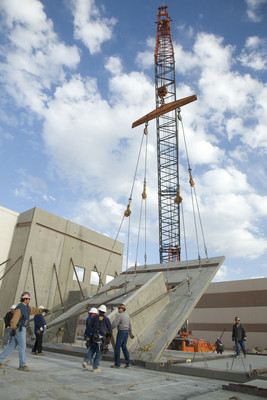Contractors adjust as economy forces projects to stall, scale back
Las Vegas contractors have seen happier days. The building boom that defined this city during the last two decades has evaporated like a desert mirage amid a deepening recession and credit freeze. Today, builders are struggling to stay afloat as developers halt, postpone, and scale back construction plans.
"The project cancellation rate is five times normal, and project delays are four times greater," said Craig Willcut, president of United Construction Co., a Nevada-based general contractor. "We have a lot of opportunity, but it's taking longer to get financing."
Companies are responding by downsizing. The construction sector lost 21,000 jobs, a 31.3 percent decline since 2008, the Nevada Department of Employment, Training and Rehabilitation reports. Contractors, meanwhile, are having to chase payment for services rendered more aggressively, and filing liens and lawsuits to get paid.
The Nevada State Contractors Board, the industry's licensing and regulatory body, saw a 40 percent increase in nonpayment-related sanctions during the last year, documents show. License revocations numbered 132 in the last 12 months, more than double the previous year's amount. Fines rose 22.5 percent during the same period. The board conducted 1,007 criminal investigations during the past year, which is a 21 percent annual increase, the agency reports.
"I've seen a dramatic threefold increase in lien filings," said George Ogilvie, managing partner of McDonald Carano Wilson LLP, a Las Vegas practice specializing in construction law. "I anticipate more of the same over the next four to six months, until the money dries up and brings things to a head. A lot of these lien claims are going to be headed off by bankruptcies. I've already seen a couple of bankruptcy filings, and there are more to come."
Construction is a cash-intensive business. Contractors must be well-capitalized to pay upfront project costs, which can include equipment rentals, job trailers, and raw building materials. The ebb and flow of progress payments from owners are crucial for contractor liquidity; historically, the industry has profit margins of between 3 percent to 5 percent of project value. This makes slow payment difficult for contractors who must pay employees, subcontractors, suppliers and vendors. The current economic crisis has banks squeezing cash, reducing risk and reneging on development loans.
Fontainebleau Las Vegas, for example, a new $3.1 billion Strip resort-casino, last month sued its lenders for reneging on an $800 million construction loan. On April 23, Fontainebleau Resorts LLC, an investment group led by Miami-based developer Jeffrey Soffer, filed a $3 billion lawsuit in Clark County District Court against the project's 11 lenders for refusing to provide prearranged financing. The complaint called it "nothing more than the banks' baseless attempt to walk away from the project and abandon their obligations." Construction activity at the 63-story, 3,815-room development has since been scaled back.
"There is increased difficulty in getting paid," said Frank Martin, president of Martin-Harris Construction, a Las Vegas-based general contractor. "Many times, in our experience, the banks pull the construction loans due to some 'wiggle' language in the loan documents about values."
Market contraction also has more contractors fighting over less work. The Clark County School District, for example, previously only had a handful of contractors vying for its work. Now, a record number of bidders compete for school work and other public projects. Long bid lists mean narrow profit margins; most public work is awarded on cost alone as opposed to best value or most-qualified.
"It is not unusual for there to be 20 bidders on a $500,000 project," Martin said. "Many times at least half of them are not qualified. This not only goes for the general contractors, but for the subcontractors as well. When housing gets slow, housing contractors try entering the commercial market. They do so by (submitting) very low prices.
"... The extremely low subcontractor gets into trouble on the project then the general contractor gets into trouble because they are bound by contract to finish the job. And they don't have enough money in the job to do that so other subcontractors don't get paid and on the cycle goes."
The slumping market and increased competition have driven down construction costs. Developers are exploiting this to save money. MGM Mirage, developer of the $8.5 billion CityCenter project on the Strip, last year rebid construction for lower-priced work. The move meant stop-work notices for several subcontractors, many of which were asked to rebid work. The economic downturn has increased local contractor availability, resulting in a crowded marketplace. Subcontractors were forced to slash margins to win jobs, which makes for riskier, less profitable work. Yet, CityCenter is one of the few large projects still under way.
"Competition has definitely gotten a lot heavier among subcontractors," Willcut said. "Subcontractors are taking the jobs to cover costs. When you start taking work cheap, it's going to catch up with you. It's not benefiting anyone including the owner or the contractor. We have had some good subs go out of business."
Low-priced work is often fraught with problems. What appears a bargain upfront can often prove more costly in the end. Contractors will bid work at cost to win the job; they hope to realize profit through change orders. Many have valid contracting licenses but lack experience in particular types of work. Doing electrical work inside a new home, for example, isn't the same as doing it inside a school or high-rise.
"More contractors are wading into the public side; the stimulus money is for public works and not private projects," said Dennis Haney, a construction attorney with Santoro, Driggs, Walch, Kearney, Holley & Thompson. "But there is a difference between a new building and a highway. It's a night-and-day difference. They have the right type of licenses so they can bid the job. But it's not the same."
The push to stretch dollars further could cause more widespread use of alternate contracting methods such as construction management at-risk and design-build. The Nevada Department of Transportation, for instance, is pursuing the first design-build job in its 92-year history. The project is a $242 million, 5.8-mile-long widening of Interstate 15 from the Spaghetti Bowl interchange in Las Vegas to Craig Road in North Las Vegas. Design-build is expected to shave a year and a half from the construction schedule.
Design-build creates single-source responsibility for construction cost, schedule and quality. The contractor and architect work as a unit, often eliminating the finger-pointing, blame-game that occurs under the traditional design/bid/build approach. Design-build encourages collaboration, innovation and creativity. It can deliver more cost-effective results in less time while reducing owner liability.
"We're certainly big advocates of alternative delivery. It works better in so many instances," said Jeff Ehret, president of Penta Building Group, a Las Vegas-based general contractor. "It allows more creative ways to get projects done. Hopefully, this recession might grease the skids somewhat for more alternative delivery projects."
Contractors, meanwhile, are adapting by leveraging relationships and hunkering down to weather the downturn. Most companies are making conservative, fiscally prudent business decisions that lead to longevity and future work.
"We are definitely retooling our business plan. There is no quick fix. It will take a couple of years to execute. All of our people are learning to adapt and wear multiple hats," Ehret said. "A lot of our revenue is going to be down compared to 2008.
"This is definitely a time for relationship-building across the board," Ehret added. "And that is no secret."
Contact reporter Tony Illia at tonyillia@aol.com or 702-303-5699.


















